About 150 pages into Ričardas Gavelis's Vilnius Poker, I am overcome with the desire for visual images of the city of Vilnius itself—one of the strongest presences in this dark and gripping novel.
"Gedimino Prospekt, Vilnius, Lithuania" by Nigel Burton
She improvises as she speaks, returning to the same place (in the story and in the city) a hundred times, or turning in circles, or wandering aimlessly. She starts to talk about her village, about her grandparents, and I know we'll shortly turn up in Gediminas Square. Mentioning her husband, we're surely cutting across Vokiečių Street (now it's Muziejaus). Her jazz of words and routes has become part of me; we're not just walking through Vilnius, but through my internal streets, too.
*******
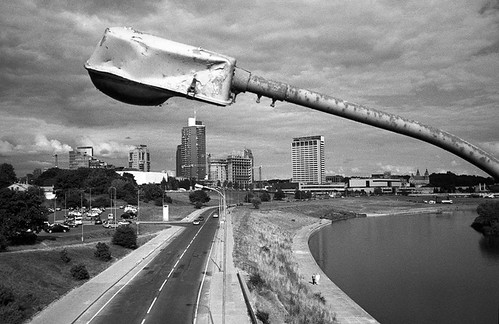
"Vilnius nuo Geležinio Vilko tilto" by Vygintas Račinskas
The water of the Neris turns and turns in a circle, you can wade into the same stream many times. You can scoop up a handful of water that saw the founding of Vilnius, drink a gulp the Iron Wolf once drank. You fling a pebble into the murky current, it plops into the water, and its echo summons some ancient sound, words pronounced once upon a time—maybe even your own.
*******
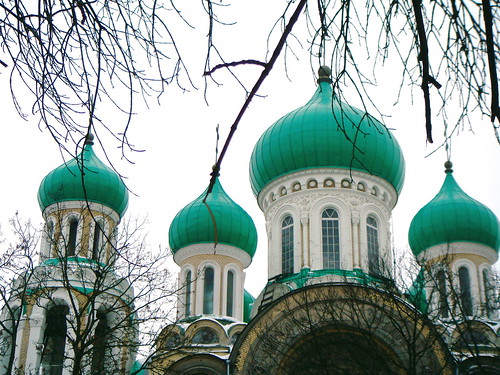
"Romanov church, Vilnius" by Kimbar
I remember the day and the place very well. The same place: across from the Russian Orthodox Church on Basanavičiaus Street. The day was sunny and clear—not just externally, but also on the inside.
*******
"Gediminas Castle" by Muz10
Now Vilnius itself is a dream city, a ghost city. [...] Only the ancient castle in the new city is unavoidably real: a lonely tower, emerging from the overgrown slopes of the hill—the phallic symbol of Vilnius. It betrays all secrets. The symbolic phallus of Vilnius: short, stumpy and powerless. An organ of pseudo-powers that hasn't been able to get aroused in a long time.
*******
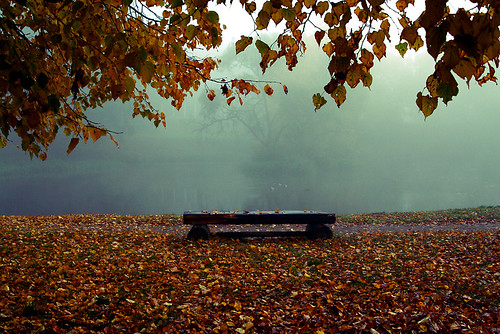
"I6" by sandalas
Vilnius is a giant cocktail, stirred together by the insane gods of fog. If a city could exist alone, without people, Vilnius would be the City of all cities. But it's people who express the spirit of a city, and if you attempt to understand what the figures in Vilnius's streets mean, what that atrophying spectacle in which you yourself play means, you'd immediately realize you're dreaming.
I walk slowly through a dream called Vilnius, while the weird sensation that all of this has already been pierces my brain. Once I went down the street in exactly the same way, in exactly the same way I considered what the dream—the yellowish leaves, blown about by the wind, and the old house in the depths of a garden—could mean...
*******
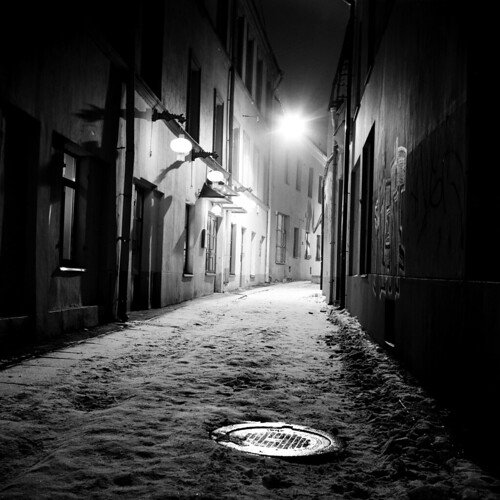
"Vilnius" by Peter Gutierrez
I got dressed and went out to wander the streets. Something inside of me forced me to take just exactly that route, pushed me along like a doll. Vilnius turned into an empty, meaningless labyrinth in which you could wander until you died without ever understanding there is no exit, that this is an absolute labyrinth. The kind where you'd never come across a dead end—that's how gigantic it is.
*******
All excerpts from Vilnius Poker, by Ričardas Gavelis, translated from the Lithuanian by Elizabeth Novickas.
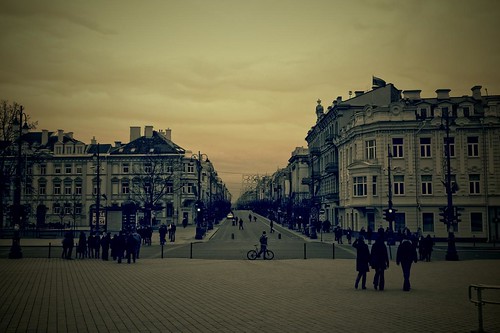



wow... gorgeous, and very nicely put together.
Brilliant, Emily, thank you. I've also been trawling the web for evocative photographs of Vilnius. First and foremost the book brings to mind post-war Vienna, which comes across wonderfully in the shots you discovered. I've seen a reference somewhere, I think Bookslut but I may be mistaken, to this book being to Vilnius what Ulysses is to Dublin.
Wow. The book sounds interesting and with the photos, just gorgeous!
Oh Emily, lovely post. Thanks so much for putting this together! I love the first photo especially, and the last.
I do have to say that I imagined Gediminas Castle as larger...but it makes so much sense that it is as it is, of course. :)
Raidergirl: Thanks! They really helped me with the reading, as well.
Anthony: Glad you like it! The Ulysses/Vilnius Poker comparison occurred to me too - there is that occasional novel that summons up place so strongly, and this is definitely one of them.
Stefanie: I'm really enjoying the book! And it's making me want to visit Vilnius.
Sarah: Glad you like it! Re: Gediminas Castle, doesn't his description make so much sense as you look at it? It really does have a certain flaccid quality about it. From what I can gather, it was larger once, but that tower is all that remains of the original castle.
When I saw the first pictures I was going to comment "what a lovely city, I should really visit it some time" and then I saw the latter and they are so dark! (but not less beautiful). It must really help to have a picture of the place when you read a book that is set in a specific city.
Interesting sequence, Emily, esp. the first and the last selections (I follow Sarah in this regard!). Unfortunately, I'm at a spot in the novel where I'm enjoying it but not as much as I was in the beginning...so I hope these pix revive my flagging interest.
I have to admit to not starting the book yet but you are making me want to go get it now. Great concept for a post. Just lovely.
Iris: Oddly, even though Gavelis's prose depictions of Vilnius are every bit as bleak as the bleakest of these images, he's somehow still making me want to visit. Odd, I know! I don't always feel the urge to see images of the settings I'm reading about, but in this case the city is such an important character in its own right.
Richard: Are you further along than I am, or not as far? I feel like in the last 20 pages or so the tone has shifted a bit...but I'm still quite engaged. Sounds like this may be an interesting discussion...
Frances: Thanks! Glad I could provide some motivation. :-)